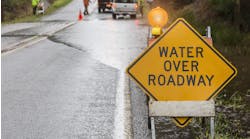This new product would make roadways a dream to drive on, would be long lasting and would have life-cycle costs lower than the poorer performing product it would replace. Unfortunately, SHRP did not invent a Superpave construction machine to manufacture and place this new product.
When Florida heard of Superpave, the claims about rut resistance fell upon eager and waiting ears. Florida is a high growth state, but it is not a manufacturing state. Therefore, as the increasing population demands more creature comforts, more trucks must be mobilized to import the goods to satisfy the demands. Because Florida ranks in the top five states in the production of citrus and vegetables, it sends these products out of the state to balance the import/export ratio. This means more semi-trucks on the roads. Throw in the high ambient temperatures and you have an invitation to rampaging ruts.
So in late 1995, the Florida DOT (FDOT) started its first Superpave project. Florida experienced all the same problems that the other states had when first using Superpave. Some of those problems have already been well publicized in other writings but there were two in particular that seemed most obstinate when corrections were attempted.
First, achieving our target of 94% density in the field (measured using drilled cores) and, second, reducing the pavement permeability to a desirable level.
Jim Musselman of FDOT developed a permeability test which gave Florida a standard test upon which success or failure could be determined rather quickly. For the next two years, Florida struggled to improve the density level and the impermeability of the coarse-graded Superpave mixes that it was trying to use. By mid 1997, the state decided to try to tempt industry to solve the density problem for them. Several jobs were let with incentive/decentive clauses in them. If the contractor obtained 94% to 95% of maximum lab density, payment was at 100% of unit bid price per lot of roadway paving. For roadway densities of 95% or greater, the contractor could earn 105% payment.
Densities below 94% prompted a penalty down to 93%, at which point the mix must be checked for permeability. This method of motivation seemed to work and now Florida is starting to pay the 105% premium payment on a few interstate jobs in the northern part of the state.
Couch Construction, North Florida division, is the contractor for one of these successful projects and is presently achieving a satisfactory paving rate with a high degree of success. Couch was founded in 1908 in Dothan, Ala., the site of their home office, and research and development center.
In 1985, Couch was purchased by Superfos a/s, a Danish conglomerate in Copenhagen, Denmark. Superfos is involved in highway construction in the U.S. and in Europe as well as packaging and chemicals, in Europe.
Their recent acquisition of J.B. Coxwell Contracting Co., gives them a total of 50 road production sites in Florida, Alabama, Oklahoma, Georgia and Kansas. Couch presently has two divisions in Florida, the South and the North divisions.
In late 1997, when Couch started placing Superpave mix on its I-10 projects, they encountered a few challenges. However, these problems got immediate attention and adjustments were quickly made to correct the problems.
First, when they were placing their initial test strip it was discovered that the air voids were too low. Darren Phillips, quality manager for Couch, worked with the FDOT district bituminous office to adjust the mix design. The quality of minus 200 material was adjusted by 0.5% and the asphalt content was adjusted by 0.3%. These slight adjustments eliminated the first obstacle, and the air voids were back within specification. The second problem occurred when Couch saw that they were not getting sufficient density. They changed their rolling pattern, paid close attention to pavement temperatures, accepted the peculiarity of the tender zone, and changed their final roller to put a hefty load of 335 pli on the final low temperature compaction, and that issue was resolved.
Their diligence and attention to detail started paying big dividends for them. In mid-January they completed the bottom course of Superpave (50,000 metric tons of asphalt), and they have not encountered any other problems.
FDOT's district bituminous engineer, G.E. Pettyjohn, attributes Couch's success to the careful control of their aggregate and to the contractor's positive attitude. They took great pains to design their mix around the average gradation of their aggregates as they were shipped from the mine.
They also checked their incoming aggregate frequently to assure uniformity of their mix and they closely monitored the plant calibrations and mix temperatures. It has been Pettyjohn's observation that Couch employees take a lot of pride in their work; they strive to work together with the department, and they exhibit a strong desire to give the department a quality product.
Cloyce Darnell, president of Couch's North Florida division, said, "Our goal is to build value for our customers, our employees, and our shareholders. That is only possible if we have the knowledge, the skill, and the will to do the best possible job."
It logically follows then that Florida was glad to pay a premium to have the contracting industry develop their own expertise to make Superpave work. In the case of this project, Couch has recognized 105% payment for about 95% of the work done as of this writing, and the remainder has been at 100% pay. This is truly a win-win situation where Couch is being enviably successful and FDOT is quite satisfied with the final product.
Superpave has brought with it some problems, as does any new technology. But Couch Construction and FDOT have worked together to overcome those problems and to move this new technology to a higher level. The use of Superpave has been a challenge, but strides are finally being made to eliminate the rutting problems and not introduce another problem to replace one being removed.


